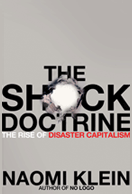The Shock Doctrine

Disaster Capitalism in Action: bank of america
Wall Street Stealth Lobby Defends $35 Billion Derivatives Haul
Christine Harper, Matthew Leising and Shannon Harrington, Bloomberg News, August 31, 2009
"Wall Street is suiting up for a battle to protect one of its richest fiefdoms, the $592 trillion over-the-counter derivatives market that is facing the biggest overhaul since its creation 30 years ago.
"Five U.S. commercial banks, including JPMorgan Chase & Co., Goldman Sachs Group Inc. and Bank of America Corp., are on track to earn more than $35 billion this year trading unregulated derivatives contracts. At stake is how much of that business they and other dealers will be able to keep....
"The Washington fight, conducted mostly behind closed doors, has been overshadowed by the noisy debate over health care. That’s fine with investment bankers, who for years quietly wielded their financial and lobbying clout on Capitol Hill to kill efforts to regulate derivatives. This time could be different. The reason: widespread public and Congressional anger over the role derivatives such as credit-default swaps played in the worst financial crisis since the Great Depression."
Big Banks Marketing Risky Lending Practices
Jessica Silver-Greenberg, Theo Francis and Ben Levisohn, Business Week, August 5, 2009
"In recent months such big banks as Bank of America (BAC), Citigroup (C), and JPMorgan Chase (JPM) have rolled out newfangled corporate credit lines tied to complicated and volatile derivatives. Others, including Wells Fargo (WFC) and Fifth Third (FITB), are offering payday-loan programs aimed at cash-strapped consumers. Still others are marketing new, potentially risky 'structured notes' to small investors....
"Some of Wall Street's latest innovations give reason for pause. Consider a trend in business loans. Lenders typically tie corporate credit lines to short-term interest rates. But now Citi, JPMorgan Chase, and BofA, among others, are linking credit lines both to short-term rates and credit default swaps (CDSs), the volatile and complicated derivatives that are supposed to act as "insurance" by paying off the owners if a company defaults on its debt. JPMorgan, BofA, and Citi declined to comment.
"In these new arrangements, when the price of the CDS rises—generally a sign the market thinks the company's health is deteriorating—the cost of the loan increases, too. The result: The weaker the company, the higher the interest rates it must pay, which hurts the company further.
"The lenders stress that the new products give them extra protection against default. But for companies, the opposite may be true. Managers now must deal with two layers of volatility—both short-term interest rates and credit default swaps, whose prices can spike for reasons outside their control."
Banks Use Life Insurance to Fund Bonuses
Ellen E. Schultz, Wall Street Journal, May 20, 2009
"Banks are using a little-known tactic to help pay bonuses, deferred pay and pensions they owe executives: They're holding life-insurance policies on hundreds of thousands of their workers, with themselves as the beneficiaries.
Banks took out much of this life insurance during the mortgage bubble, when executives' pay -- and the IOUs for their deferred compensation -- surged, and banking regulators affirmed the use of life insurance as a way to finance executive pay and benefits.
"Bank of America Corp. has the most life insurance on employees: $17.3 billion at the end of the first quarter, according to bank filings. Wachovia Corp. has $12 billion, J.P. Morgan Chase & Co. has $11.1 billion and Wells Fargo & Co. has $5.7 billion....
"Though not improper, the practice is similar to what is known as 'janitors insurance,' an insurance-on-employees technique that has long been controversial. Critics say the banks' insurance contracts are a way for companies to create tax breaks for funding executive pensions. And some families have complained that employers shouldn't profit from the deaths of their loved ones."
Bailed Out Banks Make Campaign Contributions to Politicians Overseeing TARP
Michael Isikoff and Dina Fine Maron, Newsweek, March 21, 2009
"A NEWSWEEK review of recent filings with the Federal Election Commission found that the political action committees of five big TARP recipients doled out $85,300 to members in the first two months of this year—with most of the cash going to those who serves on committees who oversee the TARP program. Among them: Bank of America (which got $15 billion in bailout money) sent out $24,500 in the first two months of 2009, including $1,500 to House Majority Leader Steny Hoyer and another $15,000 to members of the House and Senate banking panels. Citigroup ($25 billion) dished out $29,620, including $2,500 to House GOPWhip Eric Cantor, who also got $10,000 from UBS which, while not a TARP recipient, got $5 billion in bailout funds as an AIG 'counterparty.' 'This certainly appears to be a case of TARP funds being recycled into campaign contributions,' says Brett Kappel, a D.C. lawyer who tracks donations. (A spokesman for Cantor did not respond to requests for comment. A spokeswoman for Hoyer said it's his 'policy to accept legal contributions.')"
Merrill Lynch Gave $1 Million Each to 700 of Its Staff
Chad Bray, Wall Street Journal, February 12, 2009
"Merrill Lynch & Co. 'secretly' moved up the date it awarded bonuses for 2008 and richly rewarded its executives despite billions of dollars in losses, giving bonuses of $1 million or more apiece to nearly 700 employees, New York Attorney General Andrew Cuomo said.
"In a letter to House Financial Service Committee Chairman Barney Frank, (D., Mass.), Mr. Cuomo said the Wall Street firm awarded $3.6 billion in bonuses to more than 39,000 employees before its Jan. 1 purchase by Bank of America Corp., including more than $121 million to four top executives.
"Mr. Cuomo, who is probing compensation practices at financial firms, said he was told by Merrill's board in November that any bonuses to be paid would be 'based upon a combination of performance and retention needs.'
"'Rather, in a surprising fit of corporate irresponsibility, it appears that, instead of disclosing their bonus plans in a transparent way as requested by my office, Merrill Lynch secretly moved up the planned date to allocate bonuses and then richly rewarded their failed executives,' Mr. Cuomo wrote in his letter."
Bailed-Out Companies Spend Millions to Lobby Congress
Elizabeth Williamson and Brody Mullins, Wall Street Journal, January 23, 2009
"Troubled financial institutions and the Detroit auto makers continue to spend heavily on lobbying Congress while accepting billions of dollars in U.S. government money, reports to Congress suggest....
"Bank of America Corp., whose heavy losses prompted it to appeal to the government for a second bailout this month, spent $4.1 million on lobbying last year, nearly $1 million more than in 2007. The bank spent $820,000 on lobbying in the last quarter, about one-fifth less than in the third quarter. Bank of America is in line to receive a total of $45 billion from the government, including $20 billion committed by the Treasury this month....
"Congressional filings show that lobbying by American International Group, which the government took control of in September, continued in the fourth quarter, despite the government's holding 78.8% of the company. Congressional filings show that AIG spent $1.08 million in the fourth quarter. AIG's 2008 lobbying spending was $9.5 million, $1 million less than in 2007....
"In October, after the Wall Street Journal reported that AIG was lobbying states for more favorable interpretations of a law that would place new controls on mortgage originators, Sen. Feinstein and Republican Sen. Mel Martinez of Florida introduced legislation that would ban recipients of taxpayer money from lobbying. The two lawmakers are seeking sponsors for a House version of the bill."














